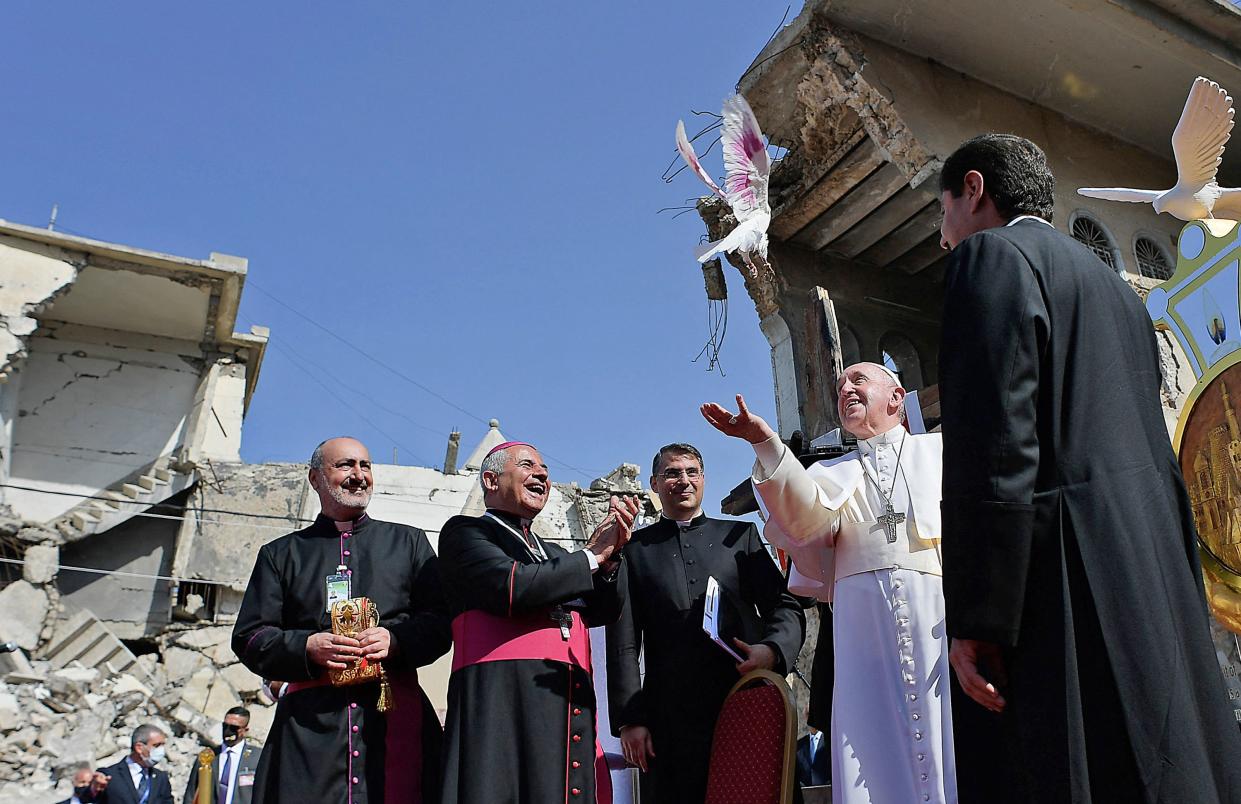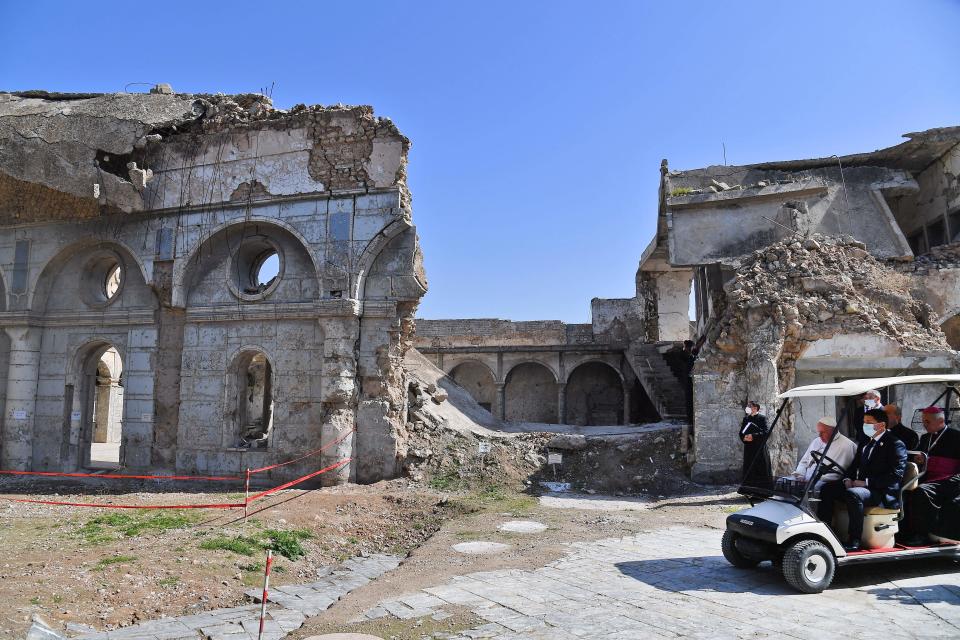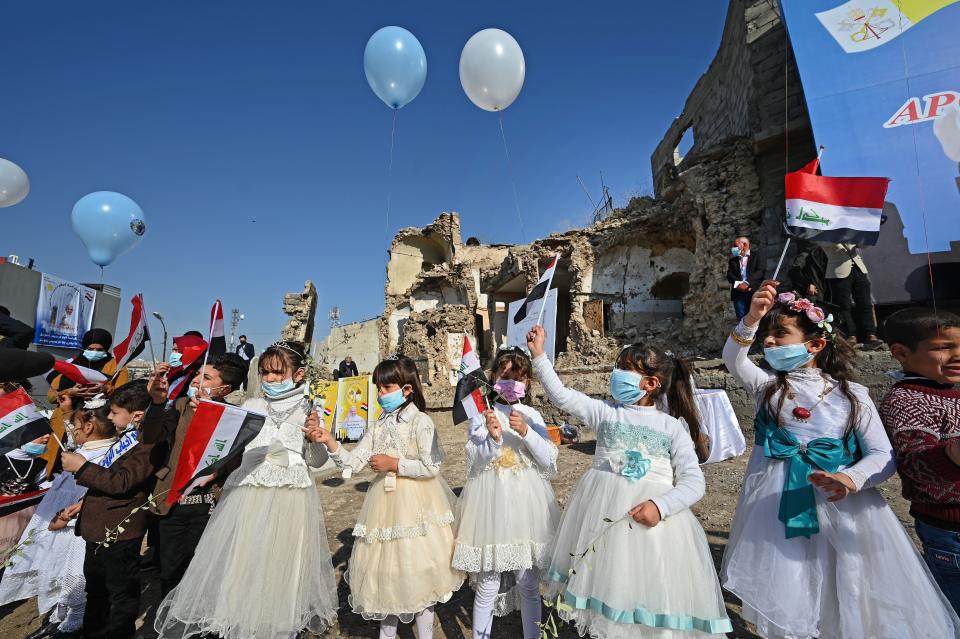Pope prays for war victims during historic visit to former Isis stronghold of Mosul

Pope Francis, accompanied by the Chaldean Catholic Archbishop of Mosul Najib Michaeel Moussa (left), looks on at a square near the ruins of the Syriac Catholic Church of the Immaculate Conception (al-Tahira-l-Kubra), in Mosul on 7 March, 2021
(AFP/Getty)Pope Francis met the father of Alan Kurdi, the drowned boy whose body washed up on the shore became an emblem of the suffering of refugees, as his extraordinary three-day tour of war-wracked Iraq came to a close.
The Pontiff had earlier brushed off security concerns, taking a helicopter to the former Islamic State stronghold of Mosul where Isis first declared its caliphate, to remember thousands killed the brutal conflict in a ceremony held in the bombed out remains of several churches.
He then traveled to nearby Qaraqosh, that was once Iraq’s main Christian city before it was ransacked by Isis, before pressing on to the Iraqi Kurdish city of Erbil where spoke with Abudallah Kurdi. Abdullah’s three year old son Alan had drowned along with his mother and brother when a smuggling boat taking them to Europe capsized off the coast of Turkey in 2015. The image of the little boy of the show captured the world’s attention as millions of Syrian fled civil war there and tried to board similarly rickety boats to Europe.
“The pope spent a long time with him (Kurdi) and with the help of an interpreter was able to listen to the pain of a father for the loss of his family,” The Vatican said.
The 84-year-old Catholic leader had also held a mass at a packed stadium in Erbil which had been criticised by some for being a potentially lethal super spreading event as Iraq witnesses new coronavirus daily records.
To the ecstatic crowds he preached about forgiveness and said that Iraq was very much in his heart.
“The road to a full recovery may still be long, but I ask you, please, not to grow discouraged. What is needed is the ability to forgive, but also the courage not to give up.”
It ushered in the end of the 5- 8 march trip which was the first ever papal visit to the country, and has seen the pope travel to some areas rarely visited by foreign dignitaries. He has criss-crossed the country from the ancient Mesopotamian site of Ur in the south to Najaf, the holiest city in Shia Islam, where he met the highest Shia cleric Grand Ayatollah Ali al-Sistani.
He spent Sunday morning in Mosul, one of the oldest cities in the world, where he welcomed by singing crowds waving flags and olive branches, a mix of Christian and Muslim returnees to the city.
Security was tight, with checkpoints closing off almost every entrance to the city and thousands of additional troops patrolling roads and streets.
There the pontiff made his way to Hosh al-Bieaa, or Church Square, which once housed several different places of Christian worship but which were ransacked by Isis who stormed the city in 2014. It lies just a few hundred metres from Mosul’s Nuri Mosque, from where slain Isis chief Abu Bakr Al-Baghdadi first declared Isis’s caliphate and later vowed to conquer Rome.
The contrast was stark and moving.
Dwarfed by towering slabs of ashen rubble and bullet-riddled walls, Francis addressed a congregation from the remains of the Syriac Catholic Church, which the jihadists had turned into a tribunal for their brutal religious police.The roof of the church was later clawed off by airstrikes during the war to liberate the historic city but has recently been restored by Unesco.
On Sunday the Pope, visibly moved by the devastation around him, prayed for all of Mosul’s dead. “How cruel it is that this country, the cradle of civilisation, should have been afflicted by so barbarous a blow, with ancient places of worship destroyed and many thousands of people Muslims, Christians, Yazidis and others forcibly displaced or killed,” he said.
“Today, however, we reaffirm our conviction that fraternity is more durable than fratricide, that hope is more powerful than hatred, that peace more powerful than war.”
The UN agency said ahead of his visit that his arrival in the decimated Christian northern heartland will come as a “message of peace and unity supported on a pillar of diversity”.
Unesco said that Mosul was still largely in ruins, its heritage sites reduced to rubble, religious monuments and cultural antiquities damaged and thousands of inhabitants still displaced leaving them scarred and with immense humanitarian needs.

In a stark reminder of the still precarious situation of the city, the Armenian Orthodox Church, which is adjacent to the church where the Pope addressed a congregation, remains closed off to the public due to fears of mines.
“We hope this visit brings people back to Mosul, so many have left for good,” says Sahar Youssef, 50, who fled Isis in 2014 and is the sole member of her family to return to the city.
“I came back because my heart is in Mosul but so much of it needs to be rebuilt, so much is still devastated. I hope this visit spurs the Iraqi authorities on to rebuild.”
Pope Francis later travelled to nearby Qaraqosh, which was once home to Iraq’s largest Christian community but now, according to local leaders, holds just 21,000 people, a third of the pre-Isis population after thousands who fled are still too afraid to return home.
There he was set to open the recently rehabilitated church which locals told The Independent had been used by Isis for training children how to use weapons and was badly burned.
Haunted by war and persecution, the dwindling Christian population of Qaraqosh who have returned to their homes say they hoped that his visit would cast an international spotlight on the embattled city and encourage more Christians to come back.
One of them is Jamel, 32, a civil society leader whose parents in 2014 barely escaped Qaraqosh alive. His two aunts were not able to get out in time before Isis stormed the city. They were kidnapped and enslaved by the jihadists who unsuccessfully tried to force them to convert. Seven years later the two women are still missing.
“We hope the Pope’s visit will make a difference and encourage people to return. Maybe it will make the international community really care about us,” he said on the eve of the visit, his voice cracked with emotion.
Francis wrapped up the day with a Mass in the stadium in Irbil, in the semi-autonomous northern Kurdish region. He arrived in Irbil early Sunday, where he was greeted by children in traditional dress and one dressed as a pope.
The pontiff’s visit comes at a critical time for Christianity in Iraq, one of the oldest churches in the world that predates the creation of the modern-day state.

Father Emanuel Youkhana, an Assyrian leader and head of Christian Aid’s programme in Northern Iraq (CAPNI), said there was a real fear of the permanent demographic change in Iraq which before the US-led invasion was home to over a million Christians but, after years of persecution and violence, has shrunk to just over 200,000.
Tens of thousands not only fled their homes to other parts of Iraq but have left the country to be resettled abroad for good.
This is most keenly felt in the north of the country in areas like Mosul and the adjacent Nineveh Plains which were swallowed up in Isis’s so-called caliphate. Even after the collapse of the group’s territorial hold, many Christians still feel persecuted, treated as unequal citizens and say they are subject to land grabs and more recently attacks from militias.
“The area is home to nearly 2,000 years of Christian history. It is very symbolic, but now we are fighting to keep any Christian existence and identity alive,” said Fr Youkhana.
“In Qaraqosh they had big cathedrals, libraries, monasteries, infrastructure but in that one night when Isis took the city, they found themselves begging to find a corner to pray.” And so, he said the visit by the Pope means a great deal to those who are trying to rebuild the Christian community.
“This isn’t just a statement of solidarity this is an extraordinary action.
“In Mosul just a few dozen families have come back and even then, it is mostly to protect the homes of relatives now living in the diaspora. There is no real return.
“We are losing ground across the entire area. I am worried about permanent demographic change.”
The Pope’s visit has also been praised for promoting coexistence and unity in fractured Iraq.

Just the day before flying to Mosul he held an interfaith meeting in the ancient Mesopotamian city of Ur, the birthplace of Abraham and sacred to Christianity, Islam and Judaism. Before that he was in Najaf, the holiest city in Shia Islam, where he met Grand Ayatollah Ali al-Sistani.
It marked the first time a pope has met such a senior Shia cleric. The Vatican said that Pope Francis thanked Iraq’s top Shia cleric for having “raised his voice in defence of the weakest”.
Sistani had said he “affirmed his interest in Christian citizens living like all Iraqis in security and peace in full to their constitutional rights”.
The notoriously reclusive 90-year-old cleric wields enormous influence over politics. His edicts sent Iraqis to free polls for the first time in 2005, rallied hundreds of thousands of men to fight against Isis in 2014 and toppled an Iraqi government under pressure from mass demonstrations in 2019.
And so, the meeting between the two leaders and the statements which followed could give Iraq’s Christians a boost: a show of solidarity and support, and a message of coexistence from al-Sistani could help secure a better future.
Senior clerics in the city told The Independent that the visit to Najaf would open the country up for similar meetings in the future.
“It is not easy to visit here and so this in itself is something valuable. We hope it will be the incubator for such a meeting in the future,” said Sheikh Ali Bashar, the son of Ayatollah Bashir, another leading cleric in the city.
“This will be an insight into the future economic and political development for Iraq, showing that Iraq can be the location for such a historic kind of meeting, that it can in the future achieve everything,” he added.
“It sends a powerful message that we should focus on peace, coexistence and forgiveness.”
Read More
Their crumbling schools are scars of war – but is there hope for the children of Mosul?
How can a Greek tragedy help Mosul heal?
Isis may have been defeated a year ago in Mosul, but the ideology that caused it to grow lives on
Christians gather to celebrate Christmas in Mosul church for first time since Isis driven out

 Yahoo News
Yahoo News 
